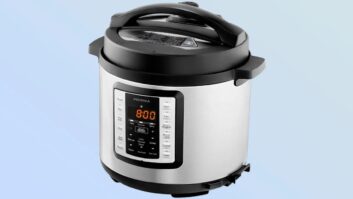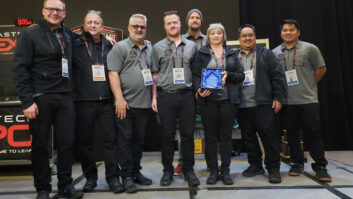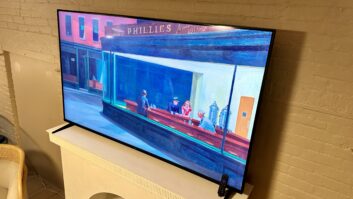For New York’s remaining CE chains, a strong offense is apparently the best defense.
Faced with a 45-store siege of their home turf by Best Buy beginning next year, plus a slew of new Circuit City units and a revitalized Radio-Shack, hometown dealers are not only holding their ground, they’re expanding it.
Within the past two weeks, each of the city’s top CE merchants – 6th Avenue Electronics, P.C. Richard & Son, Tops Home Appliance and The Wiz – have opened new stores in New York and neighboring New Jersey.
Driving the expansions is a zealous belief in their core business plans, and the same gritty determination that saw them through this market’s bloody CE shakeout. Indeed, the chains are the sole big-box survivors of a decade-long consolidation that swept away such CE stalwarts as Brick Church, Crazy Eddie, Newmark & Lewis and Trader Horn.
Now, on the eve of Best Buy’s Big Apple blitzkrieg, store executives are conveying a cool confidence as they gird themselves for what could be, at least for some, the regionals’ last stand.
“I don’t expect any problems from Best Buy,” said Leon Temiz, founder and CEO of 6th Avenue Electronics. Standing on the selling floor of the chain’s sixth store, a 15,000-square-foot box that opened last month in suburban West Long Branch, N.J., Temiz argued that his business actually benefits from its proximity to national category killers.
“Since Circuit City has been in our territory, it’s been a blessing for us,” he said, citing the “excitement” that the stores – and their blanket advertising – brings. Indeed, Temiz actually seeks out Circuit locations when scouting new real estate, and his latest store is no exception: Bricks are already being laid for a forthcoming Circuit storefront just a quarter of a mile down the road.
“We like to be next to them,” he said. “Besides, sooner or later the major guys will be in your town anyway.”
Temiz believes that 6th Avenue’s focus on high-end products, home theater, custom installation and full service will differentiate it from the national chains’ quick-turn approach, permitting a peaceful coexistence.
“Our products are higher-end, and our clientele demands a higher level of service,” he said. “Their products I can just pick up off the shelf.”
So far, the strategy appears to be paying off. Comp-store sales are up 30% year-to-date; a second new unit, which opened in northern New Jersey in April, is performing ahead of plan; and total sales are expected to hit the $80 million mark for the year.
Meanwhile, one week later, P.C. Richard president Gary Richard was presiding over a ribbon-cutting ceremony marking the opening of the chain’s 41st store. The unit, a 15,000-square-foot former Burger King located on Manhattan’s Upper East Side, is the retailer’s second on the island, and its second store opening this year.
“It’s difficult to find a freestanding store in Manhattan,” Richard said, “but we opened a downtown store three years ago, and now we have one uptown. We like to have sister stores.”
Richard, like Temiz, appeared unruffled by the prospect of Best Buy moving into his backyard. “Look, P.C. Richard has always lived with competition. This is not a virgin company. This is a tough market, but we’ve been in business for 90 years, and many competitors have come and gone over that time. We’ve coexisted with Circuit City for three years now, and we will coexist with Best Buy too.”
What makes Richard so secure in his company’s long-term prospects is a not-so-secret formula that he describes as a three-legged stool, built on “loyal manufacturers, good, dedicated employees, and a loyal customer base.” That, he said, is the winning recipe that has carried the company for four generations and will continue to serve it well into the 21st century.
“Besides,” he said, “we welcome the competition. Competition makes you better.”
For Tops Home Appliances, formerly Tops Appliance City, the impending competition from Minnesota is, at the very least, making the company different. Radically different.
This fall, the 11-store chain announced plans to exit the consumer electronics business by year’s end, and to focus instead on mid- to high-end major appliances and housewares.
The strategy calls for the conversion or creation of 15 to 20 new-format stores designed to showcase such top-tier brands as Bosch, GE Monogram, Jenn-Air, Sub-Zero, Thermador and Viking, and to make custom kitchen cabinet design and installation a key focus.
To realize this sea change, Tops laid off 425 of its 500 sales associates, moved from a commissioned to non-commissioned salary structure, and sold three of its leases – including a 100,000-square-foot flagship store and warehouse – to, of all tenants, Best Buy.
Tops is using the $10 million proceeds to pay for the new-format stores, the first of which, replete with a working demonstration kitchen, debuted in New Jersey last month. A second unit is set to open before Christmas, and a third opening is planned for April.
“We didn’t see great things on the horizon for consumer electronics in this market,” explained Tops CEO Rick Jones. “What’s happened in other markets tells you that something will have to change. I can’t think of a single market in the U.S. with four strong regional players.”
By keying into major appliances, he said, he sidesteps Best Buy, where majaps make up less than 10% of the business, and Circuit City, where appliances account for less than 20% of sales. Moreover, appliances and custom kitchens play into the region’s unusually robust housing market, while the high-margin, prestige brands that Tops now flaunts are leading the sector in sales growth.
Also embarking on a chain-wide store redesign is The Wiz, the 41-unit CE specialist that was brought back from the brink of extinction last year by telecommunications and entertainment conglomerate Cablevision Systems.
The new format, reflected in two store openings late last month, takes an “experiential retailing” approach to store design, the company said, by providing state-of-the-art listening stations, interactive computer kiosks, and other hands-on displays.
Are new stores, new formats and new business plans sufficient to fend off the big-box barrage? Will this town prove big enough to support four regional players after Best Buy’s arrival? Or will their best-laid plans go the way of failed rear-guard actions in other besieged markets?
According to Best Buy chairman Dick Schulze, who describes the chain’s planned New York presence as “the largest of any we’ll open,” the writing’s already on the wall.
Based on past experience, he said, “We’ll gain market share from a combination of family-run businesses and regional chains. We’ve found that many well-entrenched businesses don’t move with the times, and a goodly part of our revenue will be transferred from regional retailers.”











